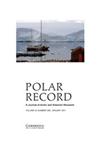皮拉米登的兴衰:在更广泛的地缘政治和环境背景下的一个城镇的故事
IF 1.6
4区 环境科学与生态学
Q3 ECOLOGY
引用次数: 5
摘要
近几十年来,北极地区的气候变化变得非常明显。除了这些气候影响外,环境还经历了与人类活动增加有关的严重人为压力,包括自然资源的开发和旅游业。早在20世纪40年代之前,苏联就迅速抓住了开发斯瓦尔巴群岛部分自然资源的机会。在本文中,我们介绍了斯瓦尔巴群岛中部的一个采矿定居点皮拉米登的故事。苏联小镇在20世纪70 - 80年代经历了鼎盛时期,但在90年代末开始走向衰落,这与苏联的整体经济和地缘政治形势非常吻合。利用历史航拍照片说明了过去采矿活动和有关城市基础设施发展的影响。地形结构最显著的变化与河网的调整、道路、水库的建设以及明显与采矿有关的活动有关。尽管人类活动的一些痕迹可能会持续几十年或几个世纪,但在1998年该镇被遗弃后,自然过程很快就淹没了城市的基础设施。如今,俄罗斯一直试图恢复定居点,特别是通过支持旅游和研究活动。本文章由计算机程序翻译,如有差异,请以英文原文为准。
The rise and fall of Pyramiden: The story of a town in a wider geopolitical and environmental context
Abstract Climate change has become significantly pronounced in the Arctic over recent decades. In addition to these climate effects, the environment has experienced severe anthropogenic pressure connected to increased human activities, including the exploitation of natural resources and tourism. The opportunity to exploit some of the natural riches of Svalbard was promptly grasped by the Soviet Union well before the 1940s. In this paper, we present the story of Pyramiden, a mining settlement in central Svalbard. The Soviet town experienced its golden age in the 1970–1980s but fell into decline in the late 1990s which corresponds well with the overall economic and geopolitical situation of the Soviet Union. The impacts of past mining activities and related urban infrastructure development are illustrated with the use of historic aerial photographs. The most pronounced changes in the terrain configuration were connected to adjustments of the river network, construction of roads, water reservoirs, and obviously mining-related activities. The natural processes overwhelmed the city infrastructure rather quickly after the abandonment of the town in 1998, though some traces of human activities may persist for decades or centuries. Nowadays, Russia has been attempting to recover the settlement especially through support of tourism and research activities.
求助全文
通过发布文献求助,成功后即可免费获取论文全文。
去求助
来源期刊

Polar Record
环境科学-环境科学
CiteScore
1.40
自引率
25.00%
发文量
26
审稿时长
>36 weeks
期刊介绍:
Polar Record is an international, peer-reviewed scholarly periodical publishing results from a wide range of polar research areas. The journal covers original primary research papers in the humanities, social sciences, physical sciences, life sciences, and polar technology, as well as papers concerning current political, economic, legal, and environmental issues in the Arctic or Antarctic. Polar Record endeavours to provide rapid publication, normally within nine months of initial submission.
 求助内容:
求助内容: 应助结果提醒方式:
应助结果提醒方式:


